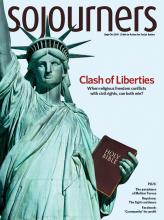IN THE TERM that begins this fall, the Supreme Court will hear the case of Masterpiece Cakeshop v. Colorado Civil Rights Commission. The nine justices will decide: Is a baker with sincerely held religious objections to same-sex marriage obliged—by anti-discrimination laws—to bake a wedding cake for a same-sex couple?
But underneath the frosting, the case exemplifies a much broader conversation in which religious liberty is pitted against civil liberties. In this ongoing fight, sides are often split down partisan lines, with conservatives championing religious liberty and liberals defending civil rights.
This religious-freedom-vs.-civil-liberties split is frustrating to many. After all, religious liberty isn’t just for conservatives; the First Amendment offers important protections to all people of faith, from Muslims who seek permits to build mosques to Christians who are conscientious objectors to war. At the same time, we care deeply about civil rights, especially in an era when so many Americans face discrimination because of their gender, sexual orientation, race, or ethnicity. In a nutshell, we want to support religious freedom for all while also protecting the civil liberties of LGBTQ folks and other minorities. But is that even possible?
Baptist minister and constitutional lawyer Oliver Thomas is optimistic, but not naive. In “Clash of Liberties,” he explains how religious liberty laws morphed from bipartisan efforts to ensure religious liberty for all into tools used by conservatives and liberals alike to press their own advantage. If we’re serious about protecting both, Thomas writes, we’re going to have to do something that’s easier said than done: lay aside our ideological differences and work for the common good.
Read the Full Article

